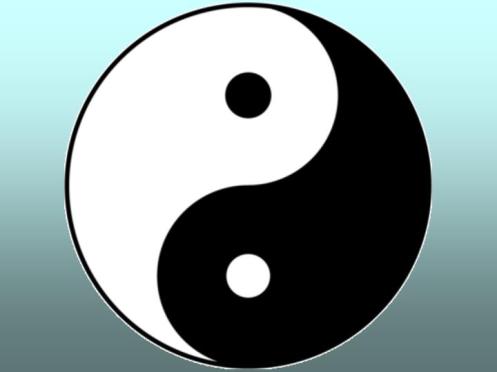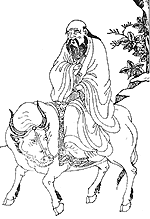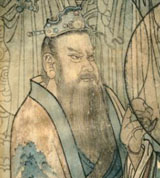My Daoism/Taoism Project
Heres my Movie, Click Here, also when it comes up please click on 10sec for a longer and easier to read viewing.
To view my Daoism Track, click HERE
Daoism/Taoism: What is it?
Daoism/Taoism… Religion or Philosophy? The answer to that question is that it is both a religion and a philosophy that is practice by millions of people. It was one of the largest, strongest religions/philosophy until fifty years ago when the Chinese government in the Cultural Revolution started to destroy non-communist beliefs by burning and destroy Daoism/Taoism temples and executing Daoism/Taoism priests. Because of this it is officially not allowed in the mainland of China, but religiously it is starting to make a come back. It still thrives in Taiwan, Southwest Asia and many Chinatowns in Western Areas, where they still celebrate rituals, festivals, and beliefs.
Daoism/Taoism: It’s Philosophy.
The philosophy of Daoism/Taoism is one of two main philosophies in China. The first writing’s of Daoism/Taoism were in the Tao Te Ching which was written by Lao Tzu, who was part of the Chinese royal court who wrote down his final thoughts before he was prepared to leave society and embark on a life of meditation. He showed the importance of following The Tao or “The Way”. The Tao is the force of life which flows through everything, giving balance to the opposing powers of Yin (Passive) and Yang (active). By observing nature in a quiet matter and its patterns and performing mediations brings one closer to The Tao which grants you greater wisdom, longevity, and ultimately, physical ad spiritual  immorality. The Tao is a “thing and a non-thing” which is a nameless force if being that works through the Universe. Doing is less important than “non-doing” according to the Daoism/Taoism Philosophy. Desire for success and power run differently in the wisdom of The Tao, which grasps that everything in life changes and you should go with the flow and adapt to these changes. In Daoism/Taoism, one must gain the “The Treasures”, first jing which is one’s vitality’s and original essences, qi physical energy and strength, and finally shen or spirit. To attain these Taoist must mediate on mental discipline, exercise, and proper lifestyle. If any of these are depleted or all of these essences lead to disease and even death. The key to Taoist meditation is wu wei, emptying the mind of all thoughts to let The Tao to enter their mind, body and spirit. Many emperors encouraged early Taoist sages to engage in arts of alchemy to find the “elixir of life” which would have granted immorality which helped them discover thousands of plants and compounds that created the Traditional Chinese Herbal Medicine.
immorality. The Tao is a “thing and a non-thing” which is a nameless force if being that works through the Universe. Doing is less important than “non-doing” according to the Daoism/Taoism Philosophy. Desire for success and power run differently in the wisdom of The Tao, which grasps that everything in life changes and you should go with the flow and adapt to these changes. In Daoism/Taoism, one must gain the “The Treasures”, first jing which is one’s vitality’s and original essences, qi physical energy and strength, and finally shen or spirit. To attain these Taoist must mediate on mental discipline, exercise, and proper lifestyle. If any of these are depleted or all of these essences lead to disease and even death. The key to Taoist meditation is wu wei, emptying the mind of all thoughts to let The Tao to enter their mind, body and spirit. Many emperors encouraged early Taoist sages to engage in arts of alchemy to find the “elixir of life” which would have granted immorality which helped them discover thousands of plants and compounds that created the Traditional Chinese Herbal Medicine.
A little more information on Daoism/Taoism is that its influence has been tremendous and it has also enriched Confucianism and contributed to the growth of Buddhism. It has provided a spiritual inspiration and also moral standards for the Chinese people, while imbuing Chinese poetry, landscape, painting, and other art forms with Daoism/Taoism love of nature and sense of serenity. In Daoism/Taoism, “Man is happy and free when he preserves his own nature and fulfills his own destiny, which he does by avoiding anxiety about life and death, rising above gain and loss, and living a simple and spontaneous life. Taoist rulers do not believe in pomp and ceremony, warfare, and inference in his subject’s lives. Through gentleness, humility, and non-struggle, man gains nobility of the soul, serenity of mind, harmony of emotions, and freedom of spirit. The Taoist’s in the 3rd and 4th centuries A.D., calling themselves Neo-Taoist’s, developed the concept of nonbeing as pure, absolute reality.
Daoism/Taoism: It’s Religion.
The Religion of Daoism/Taoism has changed for thousands of years and still is changing today. Before it was formally established during the 2nd century A.D. the princples were being artculated for thousands of years as well. The historical foundre of the Taoist religion was a popular religious leader and rebel named Chang-Tao Ling. He urged his people to read the Tao-Te Ching and in 143 A.D. organized them into the Way of 5 Bushels(or Pecks) of Rice, because that’s how much he collected from his members. They called him T’ien Shih or “The Heavenly Teacher.” The last holder of that title died in Taiwan in 1969 during the Cultural Revolution. Chang- Tao Ling created the party of Daoism/Taoism in reaction to the  spread of non-indigenous Buddhism from India. He created a complex hierarchy of Gods and Goddess, ritual libations and also feast days which appeal to many rural farmers and villagers. He called this sect “The Way of the Celestial Masters.” Over the centuries they added more sects such as “The Highest Purity” and “The Complete Reality” which also merge into the philosophy roots of following The Way or The Tao. During the Song Dynasty (970-1279), Daoism/Taoism was pronounced the official state religion of China and the Tao Tsnag the official bible of Taoism.
spread of non-indigenous Buddhism from India. He created a complex hierarchy of Gods and Goddess, ritual libations and also feast days which appeal to many rural farmers and villagers. He called this sect “The Way of the Celestial Masters.” Over the centuries they added more sects such as “The Highest Purity” and “The Complete Reality” which also merge into the philosophy roots of following The Way or The Tao. During the Song Dynasty (970-1279), Daoism/Taoism was pronounced the official state religion of China and the Tao Tsnag the official bible of Taoism.
Daoism/Taoism: The Pantheon.
In Daoism/Taoism there is a hierarchical of deities. These include gods and goddess which were mostly brought over from other religions such has Hinduism. They also have “The Immortals” which are eight figures of the Daoism/Taoism that were once brave and noble mortals that through heroic and good deeds were granted immortality and risen to the level of deities. The ancestors are the deceased love ones where families pray for guidance and make offerings to. In Daoism/Taoism there are deities for every element and every occasion in nature such as rain, water, fire, moon, stars, earth where gods resided. Today, even still, villages or communities worship there own personal god that watches over there community and watches over the weather and keeps crops from being destroy. Also, families worship family gods such as the “Kitchen God” who watches over families and there lives. These gods were granted their godly status by religious leaders or emperors. In The Tao it produced one (Tai Chi), the one produced two (yin and yang), the two produced the three (The Three Pure Ones), the three produced all of existence. The first one is known as The Jade Purity, also known as “The Universally Honored One of Origin”, “The Universal Lord of the Primordial Beginning”, and “The Heavenly Worthy of Primordial Being” who represent the beginning of all life. The next on is The Supreme Pure One also known as “The Universally Honored One of Divinities and Treasures”, “The Universal Lord of the Numinous Treasure”, or “The Heavenly Worthy of Numinous Treasures” who is deeply involved with The Tao and is also associated with yin and yang. The finally one is The Grand Pure One who is known as “The Universally Honored One of Tao and Virtues”, “The Universal Lord of the Way and its Virtue”, “Grand Supreme Elder Lord”, or “The Heavenly Worthy of Supreme Way” who represents Lao Tzu, they say that he showed himself has Lao Tzu. He is also the keeper of the spirits, known as the Lord of Man, the founder of Taoism. He was the most eminent, aged ruler, and the only one that had a pure white beard. Below them resides the Jade Emperor who watches over and manages the affairs of the earth and heavens. There are many other gods that people worship such as, Guan Yin, a goddess who bestows fortune to the needy and justice to the wrong, Lord Xuan Wu, a powerful god who controls the elements of nature, and Tai Yi, a savoir of the suffering. And where there is good there are the demons, or kuei, plague nature and the human world.
Daoism/Taoism: Rituals and Holidays.
In the Taoist religion, in the heart of it there is the jiao, which stands for ritual offering or program for a special purpose which are summoning gods and goddess, blessing the land, or redeeming lost souls. The priest that oversee these rituals are called “libationer”, since ancient times, determine which god or goddess is summoned to help and handle certain situations or problems. Following the libation, or the offering, the community share food as a symbolic communion with the Tao and these rituals survive even today in temples and even households. Most Taoists practice their religion without a priest and instead they have shrines in there own households, which they make their offerings to their deities and ancestors for health, prosperity, and some times, good seasons. In most Taoists communities, which temples and shrines are always open for lighting incense and praying to deities and mostly ancestors, but one thing there is no worship service. Ancestor’s rituals are a key factor in Chinese culture which play a key role, which places a great value on the family. During the rituals, incense may be burned, wine may be offered, and prayers are recited, which both honored the ancestor and places a blessing on his or her family. Most holidays in Taoist religions are celebrated for the birth of deities or solstices. Most of all Taoist followers celebrate Lao Tzu birthday has the most important festivals which is fifteenth day of the second lunar month. Their first major holiday is on the first day of the first lunar month which is the Chinese New Year, where Taoist hold rituals and offer sweets, a banquet, and exchange gifts with other families. At the end of each year, Taoist burn the picture of the Kitchen god which represents and dispatches him to report to the Jade Emperor, and the Kitchen god comes back at the beginning of the New Year.
